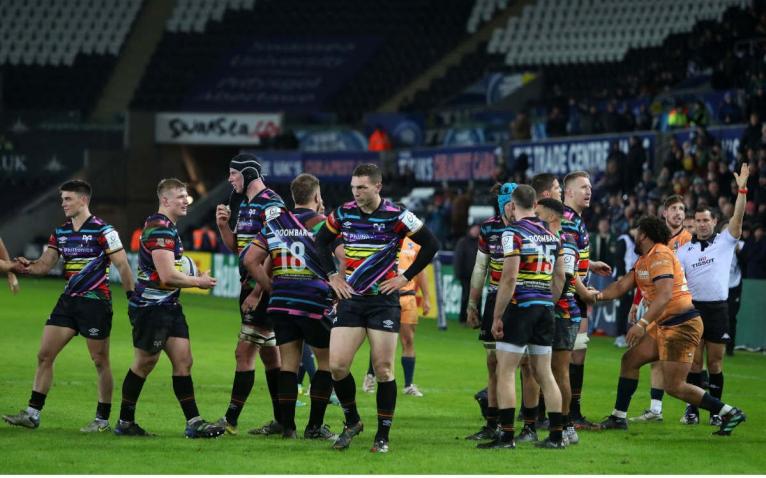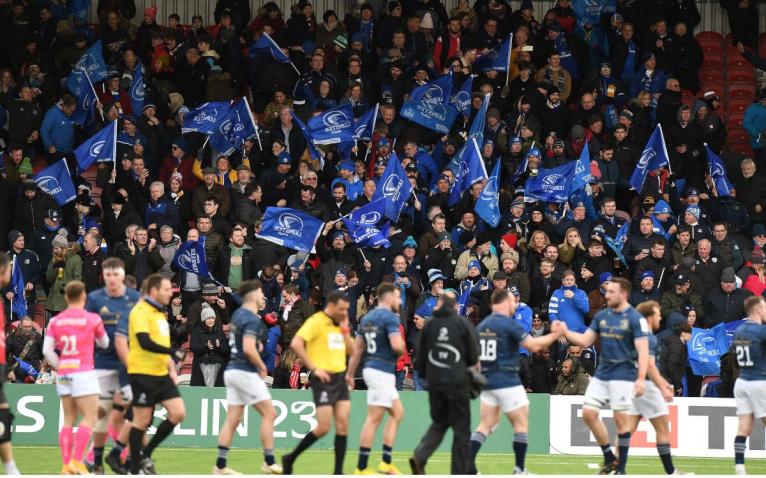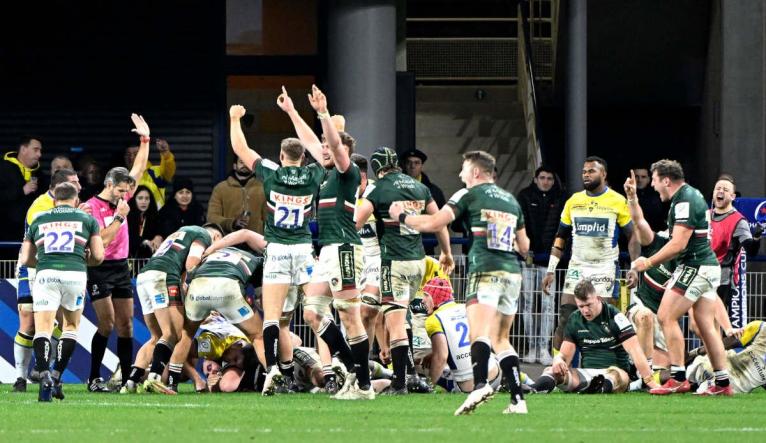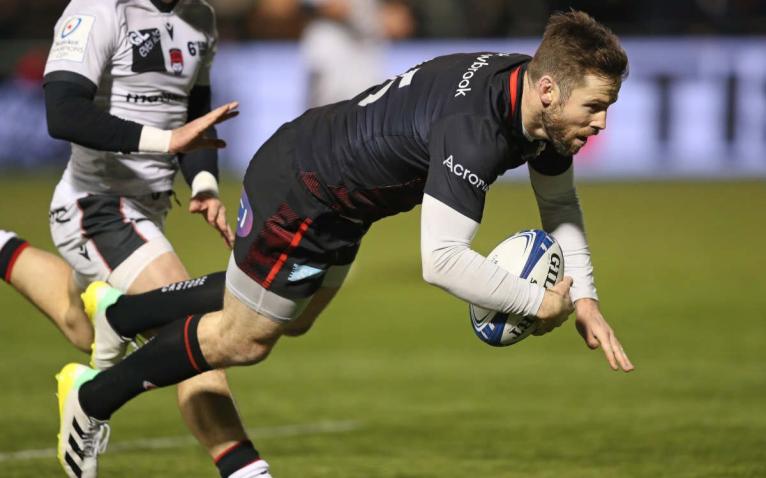The Rugby World Cup doesn’t want for hyperbole but the news Eddie Jones is back in the game at elite level with the Wallabies would have raised eyebrows with the most cynical of observers. The headline-grabbing former England coach will make England his prime target in France and with Warren Gatland back and Michael Chieka also plotting Argentina’s route to the latter stages, rugby’s super-coaches are forming for one hell of a tournament…
Here’s what RugbyPass+ made of the weekend’s other story lines…
Jones return could prove a nightmare for the RFU
Bill Sweeney would have been turning in for bed with a soothing cup of cocoa, after running the rule over Steve Borthwick’s England squad, when news started trickling in that Eddie Jones was back in business late last night. You couldn’t have blamed the RFU’s Chief Executive for hitting the whiskey cabinet to help him sleep, because those sweet dreams, could turn into nightmares.
For all Jones’ reported weaknesses – a high staff turnover, abruptness, obsessive nature, selectorial inconsistencies – he will never tire of telling Sir Clive Woodward, in particular, that he boasted the highest win percentage of any England coach (73 per cent), and his departure from England wasn’t widely celebrated. Indeed it was a mixed reaction and a number of high-profile current players were measured and supportive in public. England captain, Owen Farrell said it was ‘disappointing’, while a number of players, including Anthony Watson and Danny Care, said he was the best coach they’d ever had.
If Jones can contrive to face England in the World Cup, which could happen as early as the quarter-finals, he will be gunning for Steve Borthwick’s men. Forget any polite platitudes in public. His sacking, nine months out from a second World Cup tilt has made it personal and the former Randwick hooker, will be desperate to turn over his opponent.
It raises the stakes for Sweeney, who rolled the dice when choosing to stick or twist after a poor run of form from Jones’ England, but if Jones does manage to end up victorious, questions will be asked of his position at the helm of English rugby.
Steve Borthwick and Jones know each other well-enough to finish off each other’s sentences but their personalities are polar opposites. Jones is abrasive, chippy and courts attention, while ‘Borthers’ is a media-averse, polite, statistically-driven introvert, who will be happy for the likes of Kevin Sinfield and Nick Evans to do the talking.
Borthwick will want continuity in his England squad, and despite of the big-name omissions of Billy Vunipola, Jack Nowell and Jonny May, he knows there is the fulcrum of an England side who has the talent to reach the World Cup final. Jones has more work to do. Dave Rennie left with a 34 per cent win record, and didn’t have the credit in the bank Jones had after his spectacular early years in the job. He also need to inspire and grow a depleted rugby nation, because after the World Cup, there is the small matter of a Lions tour and a home World Cup in 2027, and despite being labelled a ‘traitor’ by an inebriated larrakin, he will be desperate to leave a positive legacy when he leaves.
In the short term, the World Cup got a whole lot more interesting. Popcorn at the ready.
Rumours of Welsh rugby’s demise have been greatly exaggerated
To use a modern colloquialism, there has been a bucketload of ‘shade’ thrown at the Heineken and Challenge Cup in the last month. Unwieldy, not fit for purpose, sub-standard. This is a little harsh for competitions who have been hammered by a pandemic and the tectonic plates of domestic rugby shifting on a regular basis. Whisper it, but it has actually lifted Welsh regional rugby from its torpor and given it a bit of self-belief.
In the 12 fixtures played by the regions, they have won nine – not win percentages they have posted regularly in the URC. Perhaps, the ‘Gatland factor’ has aided a growing sense of cautious optimism that all is not lost. It must be pointed out that this has happened in spite of the Welsh Rugby Union’s impasse with the regions, with a signed pay deal still on the table, despite a verbal agreement being mooted back in November.
Credit must go to the coaches and players who still do not know their playing budgets next season. With a backdrop of uncertainty, they have rolled up their sleeves and put their bodies on the line for their regional crests.

The Ospreys, have been leading the charge. Their pack is gaining respect, and any side who can field, Tom Botha, Scott Baldwin and Gareth Thomas and replace them with a Welsh bomb squad of Tomas Francis, Dewi Lake and Nicky Smith, is to be respected. With Adam Beard, Rhys Davies and Alun Wyn Jones in the engine room and Jac Morgan, Justin Tipuric adding punch and panache in the backrow, you suspect they will be forming the fulcrum of the Wales pack to take on Ireland in three weeks. Their win over Montpellier was one of guts and ingenuity. This was a French side loaded with stars. Paul Willemse, Zach Mercer, Louis Carbonel, Anthony Bouthier but they couldn’t break the Ospreys resolve.
The Scarlets, after a woeful first few months, have now won five out of their last six fixtures, and Cardiff Rugby have also had shown with in-form players like Rhys Carre, Mason Grady and Max Llewelyn, that they have much to give to Wales’ Six Nations squad which is named tomorrow.
Andy Farrell’s Ireland team are hardly quaking in their boots, but they may find the Principality Stadium less than the walkover many have predicted. Gatland will back himself to turn a disparate, fragmented rugby nation into contenders in nine months. After all, he’s done it before.
Leinster’s problem is Europe not the URC
Within seconds Kelleher and van der Flier were exchanging passes, and by the time the Gloucester defence had scrambled to get back in position, Jamison Gibson-Park’s support run had taken the play 40 yards upfield.
Gloucester survived but just about. Then twenty minutes later they fell for the same trick, James Ryan the recipient of another quick throw by Kelleher, van der Flier scoring off a subsequent phase. To be outwitted once is unfortunate but twice smacks of carelessness.
It summed up Gloucester’s mediocrity. They have been an absolute joke in their jousts with Leinster, losing the two games by an aggregate of 92 points. Before that, Leinster defeated Racing 42-10.

Two narratives come out of this, one that Leinster are Europe’s form team – 15 wins from 15 this season confirms that suspicion – second that the easy ride they receive in the URC will eventually come back to haunt them at the business end of the Champions Cup. The punditry team on BT Sport hinted at this latter issue again on Saturday.
But hold on a minute. In the URC, Leinster have played six matches away from home, beating Scarlets easily, 35-5, but every other fixture has been tense. They edged out Zebre by four points, Ulster by seven, Connacht by 10, Munster by one, Ospreys by five.
So where’s the easy ride? The answer is in Europe where Leinster’s average winning margin is 31 points this season and where their English and French opponents have simply been incapable of coping with their skill set and physicality.
Looking at the respective pool tables in the Champions Cup, four URC teams inhabiting the top six in Pool A, three out of the league’s four representatives in the top six in Pool B, makes you wonder. It isn’t their domestic league where Leinster are getting an easy ride; it’s in the Champions Cup. How, indeed, will they cope when they reach the business end … of the URC, that is?
Tigers roar again
These have been bruising weeks for Leicester Tigers, shorn first of their leader and fulcrum, the man who transformed them from relegation fodder to champions, and then his deputy, the emotional and defensive heartbeat of the club.
In losing Steve Borthwick and Kevin Sinfield, the Tigers were stripped of more than two coaches; a swathe of their very DNA left through the front door on its way to Twickenham.
Richard Wigglesworth has assumed the reins and though he won his first game in interim charge, at home to Gloucester, he has since overseen a painful trip to the northwest, and a thumping loss at Sale, and equally sore jaunt to the northeast, where Newcastle Falcons prevailed.
Few teams fetch up in the Massif Central and put Clermont to the sword. Even fewer do it with the kind of swagger and ruthlessness Wigglesworth’s Tigers showed on Friday night.

In the aftermath, the venerable rugby statistician Stuart Farmer plucked a gem from his catalogue: across the 1098 home matches Clermont have played at Stade Marcel Michelin since 1911, only four away teams have scored 40 points or more. The Tigers have now done it twice.
This was a Leicester team missing Dan Cole, Anthony Watson, George Martin, Jasper Wiese, Julian Montoya, Hanro Liebenberg and the recently departed Nemani Nadolo – an eye-watering volume of caps, class and size.
The victory ensures Leicester safe passage to the Champions Cup last 16 with a game to spare. It was a statement performance from the Tigers and a statement win for Wigglesworth, a hugely adroit rugby thinker who has all the tools to flourish as a coach. Gregor Townsend has been touted as a replacement for Borthwick when the World Cup is over, but the Leicester supremos will be all too aware of Wigglesworth’s burgeoning credentials for the top job.
Can Daly end international exile?
Speaking of Borthwick, the new sheriff named his first England squad today as preparations intensify for the Six Nations.
With Eddie Jones potentially riding to Australia’s rescue, taking his occasionally peculiar, frequently dogmatic, selections with him, there are a chunk of exiled players harbouring renewed hope of a recall.
Elliot Daly, emphatically, falls into that category. Savaged for his defensive flaws, he has not been seen in an England jersey since last year’s championship. He did not tour Australia, did not feature in the autumn. Freddie Steward, a man who came of age under Borthwick’s stewardship, has owned the full-back berth. He is far younger, far bigger, far brawnier. He should become a Test centurion.
Look back across those England performances in the last days of Jones, though, and the spark absent from a sputtering backline was brutally evident. Borthwick does not want for fine back-three operators but in Daly, he has a gilded play-maker, adept in three positions, at the very top of his game.

The 30-year-old has been one of Europe’s form men this season; irresistible for Saracens as their sleeker, deadlier game plan takes shape. As if to pen a very large exclamation point beside his name, he shredded Lyon on Saturday night, running in a blistering seven-minute hat-trick.
That took Daly’s haul to eight tries in 14 matches. A fine record, but it’s all the other touches of brilliance and classy flourishes that burn brightest. The beautifully measured grubber kicks; the gliding outside breaks; the intelligent distribution.
Daly will yearn for another crack with England and another shot at the World Cup. It is hard to say he didn’t deserve his recall.
Mediocrity is still getting rewarded
We could add La Rochelle to the list of Ulster’s last minute meltdowns, for the manner of Saturday’s 7-3 defeat is identical to the one-point loss they suffered against Munster a week earlier, the URC semi-final defeat to Stormers last season, the Challenge Cup semi-final capitulation to Leicester the year before, the Champions Cup disaster at Gloucester in 2020 when they led 34-24 on 75 minutes but still lost.
But no, our focus here isn’t on Ulster’s psychological frailty in endgames, it is on a Champions Cup format that facilitates a team who could qualify from a four-match pool stage despite the fact they have lost their opening three games.
Not just that, in two of those matches, Ulster scored the gargantuan total of three points. Yet here they are, one bonus-point win away from being in the same stage of the competition as six teams, Leinster, Sharks, Saracens, Toulouse, Leicester and La Rochelle, who all have a 100 per cent record. Competitions are meant to challenge teams not forgive them. That doesn’t happen in the Champions Cup anymore, not until you get to the knock-out stages.





Comments
Join free and tell us what you really think!
Sign up for free